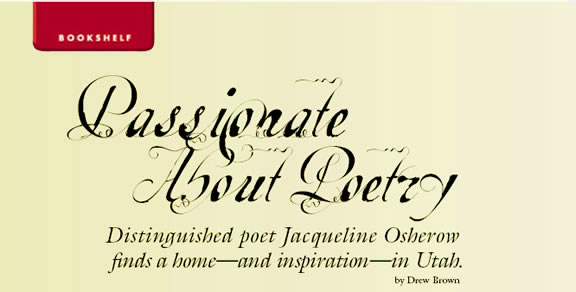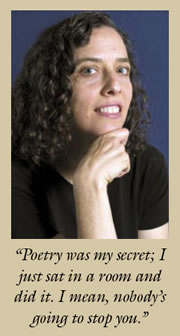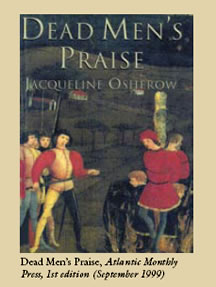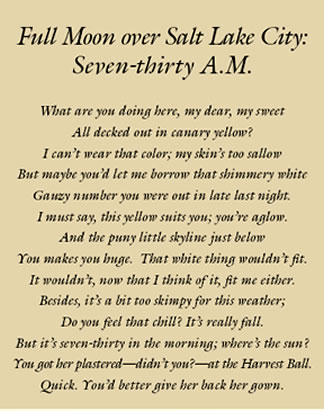
Vol. 14 No. 3 |
Winter 2004-05 |

Naturally, the first question is why Osherow, raised in a tight-knit
Jewish community in Philadelphia, would contemplate moving to Utah.
This story begins in 1989, when Osherow finished her doctoral degree at
Princeton: She was looking toward accepting a "dream job"
at a private East Coast liberal arts college when she was asked to trek
west for a job interview at the U. Osherow, who readily admits to being
"a real East Coast kid," knew nothing—beyond some awareness
of the LDS Church—about Utah.
 Everything
changed when Osherow arrived on the U of U campus. She was highly impressed
with the quality of students—and the warm reception she received
on her interview.
Everything
changed when Osherow arrived on the U of U campus. She was highly impressed
with the quality of students—and the warm reception she received
on her interview.
"They were clearly interested in me," Osherow recalls, "and treated me so well." She vividly remembers meeting faculty such as onetime U professor Mark Strand, 1999 recipient of the Pulitzer Prize for Poetry, and current Graduate Studies director Barry Weller.
That East Coast school offered Osherow the position. But somehow, the
University of Utah post had metamorphosed into her dream job.
On that initial visit, Osherow was asked to do something for the first
time—a poetry reading. Then, earlier this year, she gave a reading
for the College of Humanities at its monthly "Happy Hour," sharing
poems that could only have been written because of living in Salt Lake
City.
The event was entitled "An East Coast Jewish Poet in the West."
While there is no argument on religion, literary occupation
or current locale, labeling Osherow an East Coast poet could be called
into question. Utah truly has become her home.
She is active in the local Jewish community and with the University. As
well, she's raising three daughters in Utah: Magda (17), Dora (14)
and Mollie (10).
"I used to be very much an urban poet," Osherow says. "Utah has really gotten to me."
At the Humanities reading, she shared one of the acclaimed "Scattered Psalms" from her fourth book, Dead Men's Praise. The poem ruminates on a passage from Hebrew Psalm 121:1-2, "I will lift my eyes to the mountains, where help will come." Her Psalm IX in part reads: "there is a chance/That all I'll know of real deliverance/Is these blue-white mountains out my window/Still reeling from this morning's blast of snow."

As she explained to the crowd, "It was really only when I lived here that I finally understood that help really does come from looking at mountains."
Inspiration from Utah might surprise some in the Jewish literary community. But, as Weller points out, "Unlikely destinations are part of the fate of Jewish culture." Weller also notes that Osherow has made her Hebrew Bible class one of the U's "signature courses."
"I've always thought that Jackie is among the most gifted American poets of her generation," says Strand. "She is deeply serious in her commitment to her students."
When discussing her students and how she teaches, she again starts with a story—this from the beginning of the semester, reading her Bible as Literature class roll. "I was absolutely horrified. It said 'lecture.' I don't lecture. They have to read, they have to discuss." Osherow mentions poet Paul Celan's quote, "Poems are gifts to the attentive," which she feels is the greatest definition of poetry. To Osherow, students making their own discoveries provide the best learning experience.
Osherow's principle holds steadfast in her Poetry Workshop. Students are immersed in poetry spanning time and place: "The Mower to the Glow-Worms" from 17th-century British poet Andrew Marvell; an English translation of Rainer Maria Rilke's early 20th-century German poem "Gazelle"; and "Robin Redbreast" from contemporary American author Stanley Kunitz. From Osherow's multitude of gifts to the attentive, students select the poems to explore. Only after analysis, discussion and reflection can the actual writing of poetry begin.
"She is a fabulous teacher," says former student Craig Arnold PhD'01, an assistant professor in creative writing at the University of Wyoming. "She is passionate about poetry and is clear in communicating that passion to students."
 Osherow
also discourages students having one overarching project. "I'm afraid
it will cut off possibility," she says. "Go where you're taken.
See where that is."
Osherow
also discourages students having one overarching project. "I'm afraid
it will cut off possibility," she says. "Go where you're taken.
See where that is."
Osherow is utterly surprised to have four books of her own (and another on the way), since she always writes one poem at a time: "I didn't imagine them all fitting together, especially that first one."
That first one, Looking for Angels in New York (1988), took shape during Osherow's university years. She studied in literature programs—from undergraduate to doctoral work—but felt compelled to write.
"Poetry was my secret; I just sat in a room and did it," Osherow laughs. "I mean, nobody's going to stop you." Her writing (and eventual submission) resulted in a pleasant surprise—winning the Contemporary Poetry Series competition, meaning publication of her first book.
Looking for Angels in New York elicits themes and forms existent throughout her career: poetry in sonnets, travels to Italy, her faith and explorations of Judaism and Jewish poetry. In one poem, "Dawn," she finds inspiration in New York City's buildings, in the way she will later discover in Utah's blue-white mountains: "Dawn, even from a midtown skyscraper, /Is beautiful. Cement and glass, as if/Still dreaming, tentative. The long, lazy/Stretch of yawning stone."
Her second book, Conversations with Survivors (1994), expanded more into her traditional background in Judaism, from the Yiddish language to the Holocaust. "I was introduced far too young," Osherow says of the Holocaust. "It was such a gigantic overwhelming presence."Osherow recalls at age 7 admitting to her mother the reason she refused to take showers: She feared that gas would come out of the showerhead.
A grown Osherow wasn't seeking accounts, but her then-husband's entire family survived the Holocaust. This included his stepmother, Fany, who wanted her memories documented. The result was "Conversations With Survivors," a poem recalling Fany's experience during the Holocaust and in present day.
"Brief Encounter With a Hero, Name Unknown," a poem from her third book, With a Moon in Transit (1996), is one of her most acclaimed. Osherow tells how the poem took shape: She asked her father-in-law, a Holocaust survivor in charge of delousing at Birkenau (an extermination camp annex of Auschwitz, the Nazi's largest concentration camp), if he knew any of the SS. He told the story of Josef Schillinger, an SS officer. In the tale, a woman brought to the gas chamber grabs Schillinger's gun, killing him and three other guards before being gunned down herself. The story haunted Osherow until she wrote the poem. Since then, "Brief Encounter" has taken on a life of its own.
 Last
year, Susan Gubar released Poetry After Auschwitz: Remembering What
One Never Knew, in which she discusses "Brief Encounter."
Gubar then mentions another account of the same incident: a Tadeusz Borowski
story, "The Death of Schillinger."
Last
year, Susan Gubar released Poetry After Auschwitz: Remembering What
One Never Knew, in which she discusses "Brief Encounter."
Gubar then mentions another account of the same incident: a Tadeusz Borowski
story, "The Death of Schillinger."
Osherow was stunned—and incredibly thrilled—to discover the story had a history beyond her father-in-law's account. Merely searching online, Osherow found various accounts of the incident: It occurred in October 1943, and the woman was most likely a Polish dancer named Franceska Mann.
"My mind exploded," Osherow recalls, still astonished. "I thought it was something that only existed in my father-in-law's head and my head. Suddenly, there was external proof." It also lends insight to the way Osherow writes poetry: It's about conversations, stories and experiences, not historic research.
"I hear it, I'm relating a story I was told, it's a personal thing," Osherow explains. "It's all about memory."
This July, Osherow's efforts as a poet and teacher led to her appointment as a Distinguished Professor of English and Creative Writing. In Osherow's view it is an honor and a testament to "the University's tremendous support." Support from the university and her colleagues has enabled Osherow to "write poems that could not have been written" without grants and fellowships.
Among her honors are fellowships from the Guggenheim Foundation (1997-98) and the National Endowment for the Arts (1999-2000). Osherow's poetry appeared in Best American Poetry in 1995 (for "Late Night Tête-à-tête with a Moon in Transit") and in 1998 (for "Views of La Leggenda della Vera Croce"), and she has published many others in journals and magazines, including Paris Review, The New Republic and The New Yorker.
When asked about the accolades, she returns to her new title, grinning while sharing a story of how her daughter Dora reacted to the honor: "Mom, you're the least distinguished person I know."
The poet's fifth book, The Hoopoe's Crown, comes in 2005 from BOA Editions. Included are poems about a subject and place she has never explored—Israel. Osherow, who spent most of her career writing in forms such as terza rima and sonnets, is trying more free verse in her most recent outing.
"Israel is so austere," Osherow says. "I could not do my usual things. That landscape doesn't fit any of these generous English forms." She is excited by these challenges in her continued explorations of place and experiences in Judaism.
"You should write whatever you're obsessed by," Osherow says. "You should take it on, and that's what I'm trying to do."
—Drew Brown teaches writing at Utah Valley State College. This is his first article for Continuum.
